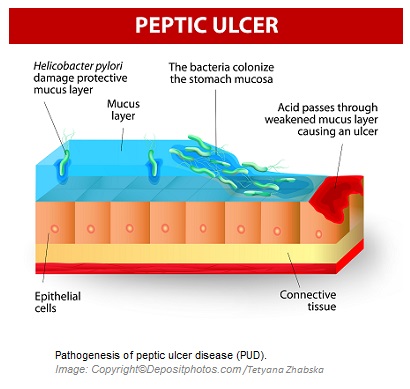
Peptic ulcer disease (PUD) is defined as disruption of the integrity of the mucosal lining of the stomach or duodenum (the first part of the small intestine) leading to a local defect or an erosion. PUD is generally classified into duodenal ulcer (DU) and gastric ulcer (GU).
A burning or gnawing discomfort or pain in the upper part of the abdomen is the main complaint of PUD. In people with GU, the discomfort or pain occurs 1 to 3 hours after a meal (hunger ain) and is relieved by antacids or food, while discomfort or pain in people with DU may actually be aggravated by foods.
Other signs and symptoms of PUD include indigestion, nausea, weight loss, and bleeding (demonstrated clinically as coffee-ground vomiting and tarry stools).
Potential causative agents and contributing factors:
- Infections:
- Helicobacter pylori (H. Pylori)
- Cytomegalovirus.
- Herpes simplex virus.
- Helicobacter heilmanni
- Medications and toxins:
- NSAIDs (non-steroidal anti-inflammatory drugs): aspirin, ibuprofen (Advil), and indomethacin.
- Chemotherapeutic agents.
- Crack cocaine.
- Clopidogrel.
- Mycophenolate mofetil.
- Bisphosphonates.
- Glucocorticoids.
- Potassium chloride.
- Medical conditions: Crohn`s disease, and sarcoidosis.
- Irradiation.
- Stress.
- Smoking.
- Dietary factors:
- Allergenic foods.
- Nutritional deficiencies, such as Omega-3 and antioxidants.
- Spices.
Nutritional Supports:
Restricted Foods:
- Fatty foods: butter, margarine, sausage, bacon, and sauces.
- Processed meats.
- Tomato and tomato-based foods such tomato paste, tomato juice, and pasta sauce.
- Fried foods: French fries.
- Omelets and scrambled eggs.
- Onion and onion rings.
- Garlic and foods containing garlic.
- Egg rolls.
- Dairy products.
- Alcohol.
- Coffee, teas, cola, and cocoa.
- Caffeinated and carbonated beverages.
- Spicy foods.
- Black and red pepper.
- Chili powder.
- Hot pepper.
- Allergenic foods.
Recommended Foods:
- Plain water: at least 2 liters a day. Water can dilute stomach acid and reduce symptoms.
- Whole grains.
- Fresh fruits and vegetables.
- Lean proteins.
- Flaxseeds.
- Flaxseed oil.
- Pineapple.
- Papaya.
- Fruits and vegetables high in mucilage: jujube, aloe vera, chia seeds, flaxseeds, kelp, marshmallow, okra, broadleaf plantain, fenugreek, and psyllium. Mucilage is a glycoprotein that has healing and anti-inflammatory activities in the gastrointestinal system by covering the mucous membranes and protecting them from getting irritated.
- Chamomile tea.
- Ginger.
- Garlic.
- Rhubarb juice.
- Artichoke.
- Vegetables high in sulforaphane: cabbage, broccoli, cauliflower, kale, collard greens and Brussels sprouts. Sulforaphane has an anti-bacterial activity against H. pylori.
Recommended Supplements:
- Licorice in the form of DGL (de-glycyrrhizinated licorice): 200 – 300 mg tablet chewed before each meal and before bed. Licorice alleviates irritation and heals inflammation.
- Aloe Vera Juice: ¼ – ½ cup three times a day. It has soothing and healing effects.
- Digestive Enzymes: A full spectrum product.
- Probiotics: A product that provides minimum 5 to 10 billion organisms per serving.
- French Maritime Pine Bark Extract: 200 – 300 mg a day. It is a flavonoid with antioxidant, anti-inflammatory, and blood flow-enhancing properties.
- Grape Seed Extract: 100 – 200 mg a day.
- L – Carnosine: 500 – 1000 mg a day. It promotes healing of ulcer.
- Zinc Carnosine: 150 – 225 mg a day.
- Zinc: 25 – 50 mg a day.
- Vitamin C: 2000 – 3000 mg a day.
- Omega – 3 Fatty Acids: 2 – 3 grams a day.
- Glutamine: 5 – 10 grams a day. This amino acid supports wound healing.
- Mastic Gum Extract: 1000 – 2000 mg a day. It is a resin obtained from mastic tree and has an anti-bacterial activity against H. pylori.
- Bismuth Subsalicylate: 500 mg before each meal and bed time (totally 2000 mg a day). Bismuth neutralizes stomach acid and has an anti-bacterial activity against H. pylori.
Miscellaneous Suggestions:
- Liver detoxification.
- Colon cleansing.

